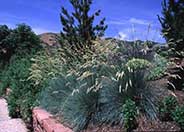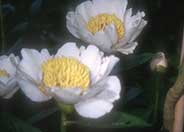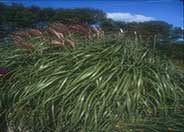

Common name:Blue Oat Grass
Botanical name:Helictotrichon sempervirens
The blue oat grass is a evergreen blue clumping grass that grows 12-18 in. tall and wide. Its showy flowers are 1-2 ft. above the foliage. This plant looks good alone as well as in mass plantings. The blue oat grass likes dry hill sides and is drought tolerant. -Cornflower Farms

Common name:Boston Ivy
Botanical name:Parthenocissus tricuspidata
This deciduous vine grows leaves that are usually lobed and divided into 3 leaflets. It clings tightly to any surface.

Common name:Japanese Tree Peony
Botanical name:Paeonia suffruticosa
Paeonia suffruticosa is a perennial and deciduous shrub. Slow growth to an eventual 3-5 ft. tall, with handsome divided leaves and very large single to double flowers in early spring. Takes several years to reveal their true potential, but the results are spectacular.

Common name:Eulalia Grass
Botanical name:Miscanthus sinensis 'Flamingo'
These deciduous grasses grow from 4-7' tall, and often turn orange or dark red before going dormant. Tall, showy spikes of feathery, curved seed heads are borne and retained well into the winter or the following spring. It should receive sun to part shade, and average to little summer watering. -Monterey Bay Nursery
More than half of the water used at your home is for outside purposes. Studies show that on average, half of the water used outdoors is wasted. The leading cause of waste is incorrectly set and poorly managed irrigation controllers. The second biggest cause of wastage is broken irrigation equipment that goes undetected. There are a few basic things you can do to make a big difference in your water use.
Click in the green box for more information
| Designer: Michael Thilgen | Stairway to the House |
Photographer: GardenSoft |
Practice grass-cycling by leaving short grass clippings on lawns after mowing, so that nutrients and organic matter are returned to the soil.
Attract, or buy beneficial insects such as ladybugs and lacewings to control pest outbreaks in your garden.